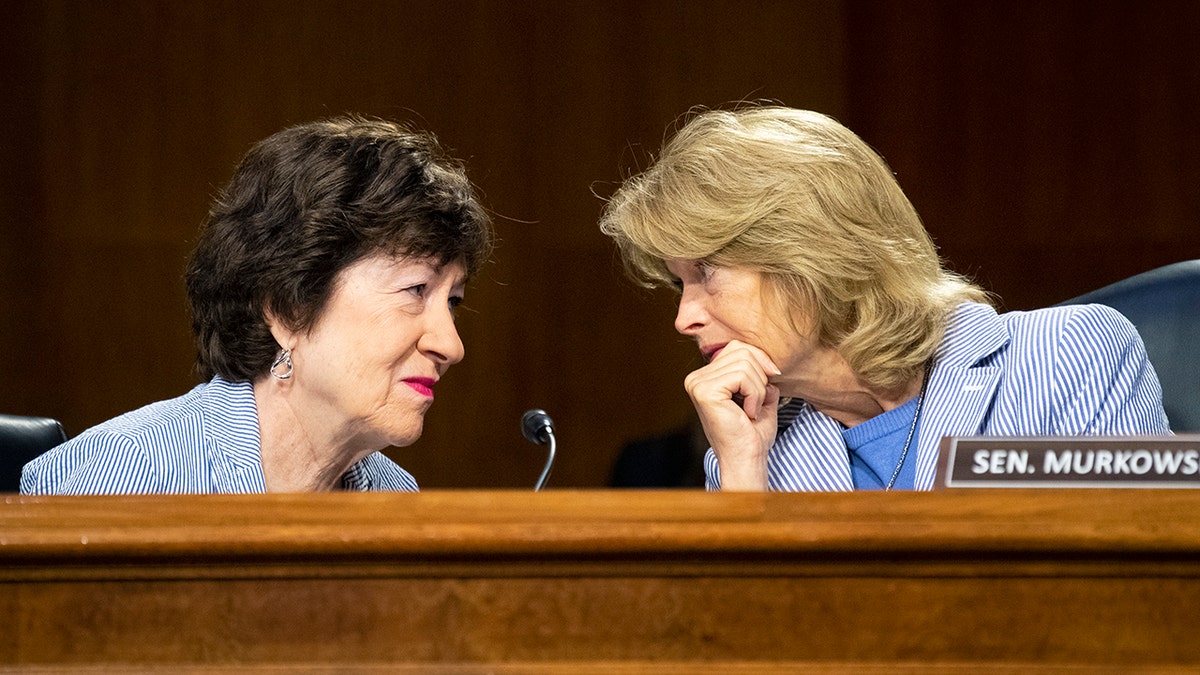A group of bipartisan senators on Monday introduced legislation that would codify protections of Roe v. Wade into federal law, protecting abortion rights and contraception access, after the Supreme Court overturned the landmark ruling and returned the issue of abortion to the states.
Democratic Sens. Tim Kaine, of Virginia, and Kirsten Sinema, of Arizona, joined Republican Sens. Lisa Murkowski, of Alaska, and Susan Collins, of Maine, in introducing the "Reproductive Freedom for All Act."
The legislation would enact in federal law "the essential holdings" of Roe v. Wade and related cases and would "enshrine in federal law the fundamental right to reproductive freedom."
The legislation would protect the ability of women to "make health care choices for themselves," the senators said in a release Monday.

Sen. Tim Kaine speaks during a news conference outside the Senate chamber, on Capitol Hill, Jan. 14, 2020. (AP Photo/Jose Luis Magana)
The bill would prohibit state regulations that impose undue burden on a woman’s access to pre-viability abortions, while allowing states to enact reasonable restrictions on post-viability abortions – provided that states do not ban abortions that are necessary to protect the life or health of the mother.
The bill would also protect access to contraceptives and preserve conscience protections.
"Every American should have autonomy over their own health care decisions," Murkowski said Monday, adding the Supreme Court’s decision has "made it imperative for Congress to restore women’s reproductive rights."
"For five decades, reproductive health care decisions were centered with the individual – we cannot go back in time in limiting personal freedoms for women," she added.

Republican Sens. Susan Collins and Lisa Murkowski joined Democrats Tim Kaine and Kyrsten Sinema in introducing a bill to protect abortion rights. (Caroline Brehman/CQ-Roll Call, Inc via Getty Images)
Kaine said the Supreme Court’s decision in June to return the issue of abortion to the states after nearly 50 years "gutted a woman’s right to make personal health care decisions" and said Congress "must restore that right."
Sinema stressed that a woman’s health care decisions should be "between her, her family and her doctor," and called the bipartisan legislation "commonsense."
Collins, in a statement, stressed that the legislation reinstates the protections of Roe v. Wade, but does not expand or restrict further.

Sen. Kyrsten Sinema said a woman’s health care decisions should be "between her, her family and her doctor," and called the bipartisan legislation "commonsense." (Mandel Ngan/AFP via Getty Images)
"By reinstating – neither expanding nor restricting – the long-standing legal framework for reproductive rights in this country, our bill would preserve abortion access along with basic conscience protections that are relied upon by health care providers who have religious objections," she said.
The introduction of the bipartisan legislation comes as President Biden has urged Congress to codify the protections of Roe v. Wade into federal law.
Last month, Biden said the filibuster "should not stand in the way" of passing that type of legislation.
The filibuster is a threshold of 60 votes in the Senate that's necessary before a piece of legislation is given an up or down vote.
"But, right now, we don’t have the votes in the Senate to change the filibuster at the moment," Biden said, stressing that Democrats need more lawmakers elected in November to "get this bill to my desk."
"So, the choice is clear," Biden said. "Either elect senators and representatives who will codify Roe, or Republicans … will try to ban abortions nationwide. Nationwide."

Pro-choice protesters hold signs in front of the Supreme Court building. (Joshua Comins/Fox News Digital)
"This is going to go one way or the other after November," he warned.
Biden, last month, signed an executive order to safeguard access to reproductive health care services, including abortion and contraception; protect the privacy of patients and their access to information; promote the safety and security of patients, providers and clinics; and coordinate the implementation of federal efforts to protect reproductive rights and access to health care.
The Biden administration also announced last month that the Department of Health and Human Services will take additional action to protect and expand access to abortion care, including access to medication that the FDA approved as safe and effective.
CLICK HERE TO GET THE FOX NEWS APP
The department is also set to take additional actions to expand access to emergency contraception and "long-acting reversible contraception like intrauterine devices (IUDs)."















































